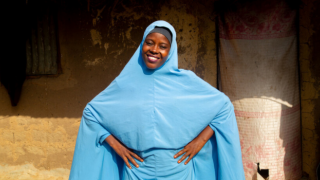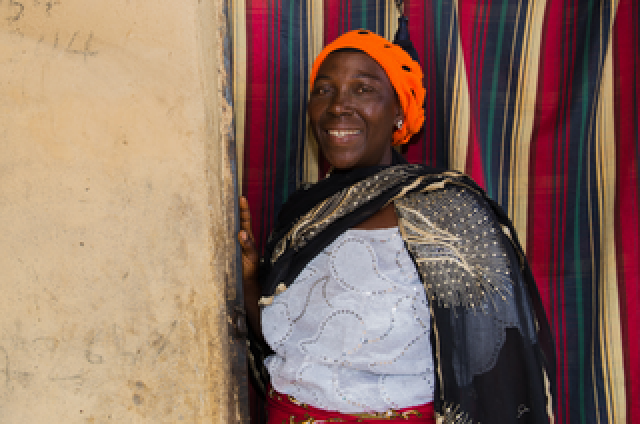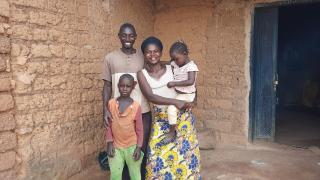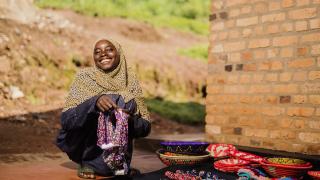Dada's Story
My name is Dada
Dada was forced to flee her home when Boko Haram threatened to kill her husband. Now she is a successful businesswoman and a leader in her community.

My name is Dada; I am 32 years old, married with two daughters aged 9 and 12 years who are both in primary school. I am from Potiskum, Yobe State in Northeast Nigeria, while my husband is from the neighbouring Bauchi State.
I completed secondary school, but my parents could not afford to send me to a higher institution, so I opted to learn how to sew. I met my husband, who is many years older than me, just before I completed my secondary education. He went to see my parents and told them he wanted to marry me. I had a younger man whom I liked, but to please my parents, I complied.
In 2013, my little daughter was just seven months old and we were living in Potiskum. That is when I experienced a crisis.
One morning, my husband and our other male neighbours received a letter from Boko Haram stating their intention to kill all the men in our locality.
Upon receiving the letter, he told us he was leaving for the nearby city of Bauchi, and he immediately went to the motor park and boarded a vehicle. Later that evening, while I and the other women in the community were still getting ready with plans of how to join our husbands, we heard sounds of heavy gunshots and vehicles coming into our street. We ran on foot throughout the night and arrived at a village called Kukar Goden in the early morning hours. We all gathered at a primary school in the village and were received by the school’s headmaster. He rallied the women in the community to assist us with food and other items. We pleaded for assistance to get some money to get to Bauchi, and the principal raised some money with which we were transported to Bauchi, where we met with my husband, and our neighbours met with their relatives.
Life in Bauchi was not easy; we had to start afresh. My husband was given a place to stay by one of his friends for three months, after which we began to pay rent. The then governor of Bauchi state gave women who were refugees from other states five thousand naira each to start something, so I began to sell rice grains to support my family.
I heard about the Stronger Women, Stronger Nations programme from a graduate, and I saw how she expanded her business and bought a goat to rear. She also told me about the financial assistance offered to women and showed me her participant handbook; I was excited about the pictures. When I informed my husband, he refused to allow me to enrol because he said he heard women were only taught how to sing songs. I asked the graduate who spoke to me to talk to him about the programme, and after listening to her, he decided to allow me to get enrolled - he even enrolled as a member of the Men's Engagement Programme.
I have seen some changes in him. He now apologises when he is wrong and would always say, 'we have been taught that women have the same rights as men, so they should be treated with respect.'
I now share work among my children, not doing everything myself. I even ask my husband to assist me with some chores, and he does not mind. This is something I would not dare to do before I joined the programme because of our Hausa tradition. I have improved my personal and family hygiene, and I make time to rest to ensure I am healthy.
From my session on Women’s Leadership, I learned about the qualities of a good leader, which helped me develop such qualities as confidence and self-esteem. As a result, I was selected by my group sisters to be our class secretary.
I have learned about my right to good health and have been told how to access good health care through referrals to hospitals that collaborate with Women for Women International. During one of my sessions on health, my trainer encouraged us to take advantage of the opportunity of being referred to seek medical care. I spoke with her concerning a health problem I have been battling with and she referred me to the Planned Parenthood federation of Nigeria. On getting there, I was attended to and given drugs which I took with my husband. I went back to see the health personnel and she explained to me that my co-wife also has to treat herself, so the infection does not come back. I spoke with my co-wife, and she agreed, she has also treated herself and we are doing well.
I joined a Village Savings and Loans Association (VSLA ) from which I collected a loan of ₦20,000 to start a short business of selling wrappers during the Sallah period. I decided to use the festive period to carry out this business because I noticed that people buy wrappers at this time, and I could make some profit from the business. I made a profit of ₦7,000. Now that the festive period is over, I have returned to my business of selling rice grains, which I expanded to include benniseed cake (locally known as “cantu”) and roasted groundnuts. From these three, I make a weekly profit of ₦2,500. I am very happy about this because I can care for my needs and save to ensure continuity of my business.
My goal is to improve my life by continuing to use what I am learning from the programme in terms of maintaining peaceful coexistence in society, exercising my fundamental human rights and respecting those of others, improving my health, growing my business and working hard to give my children a promising future.
Thank you, Women for Women International, for giving me all the support I needed to become a better me.
THROUGH DADA'S EYES
Last year, Dada featured in our first ever virtual reality (VR) film showing a day in the life of a woman in our Stronger Women, Stronger Nations programme. Join Dada to witness the transformational power of our global community's support in action. Through Dada's Eyes was made possible thanks to funds generously raised by players of the People's Postcode Lottery.
Top tip: Use the settings toggle on this YouTube video to increase the quality to 2160s. And remember to use your mouse to move around the screen for a fully immersive experience!
Do you own a VR Headset?
Watch through a headset for added impact
- Find the ‘YouTube VR’ app on your headset
- Click in the search bar and type: ‘womenforwomenuk’
- Find the film called ‘Through Dada’s Eyes’ – if you filter results to see 360 films only, you will find it there
- Make sure you have enabled subtitles on the video
- Press play to join Dada in Bauchi, Nigeria – and enjoy!
Josephine
subtitle:
At 31 years old, Josephine is married with two children. She is from Nigeria, where she had to drop out of school after falling pregnant. Now, she hopes to continue her education to university level. Read her story.
Euphrasie
subtitle:
Through genocide, rape and the loss of two children, Euphrasie never lost hope. Read her story, from forced marriage to skilled beadworker and her family's breadwinner.
Yusra
subtitle:
I was very disappointed and stressed when the new government (in Afghanistan) took over because it was so hard for me to enrol in this programme, and suddenly I couldn't learn anything, but when I heard about the resuming of the programme, I was very happy.




